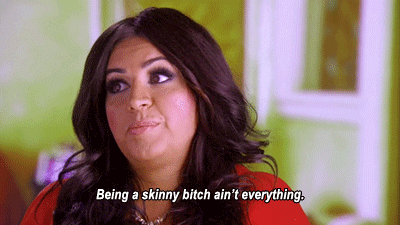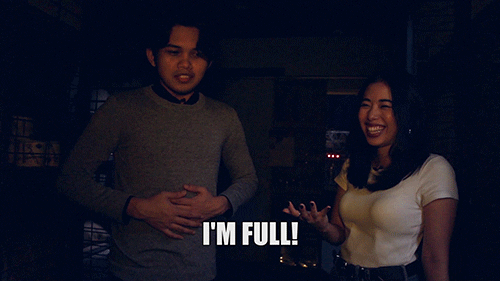Are you someone who has a literal love/hate relationship with food? If so, and you're kinda at your wit's end about it, let's talk about intuitive eating for a hot second. If you've heard the term before but you're not 100 percent sure what it means, to be an intuitive eater means that you have figured out a way to 1) enjoy food without feeling guilty, 2) discern you're truly hungry vs. when you're relying on food as a coping mechanism and 3) know how to make peace with your food choices without overthinking, starving yourself or being obsessed with dieting. In short, intuitive eating is about approaching food from a place of rational thinking, a healthy sense of emotions and gut instinct—not one of these points; all three of them.
When someone has mastered how to eat intuitively, the obsession with losing weight and the desire to comfort eat tends to become less of an issue because, when you give yourself permission stop seeing food as "the enemy", it opens up a world of possibilities where you're able to decide what foods are best for you, what should be consumed in moderation and what is about choosing what is ultimately great for your mind, body and spirit—rather than simply what will change the number on your scale in your bathroom.
Are you ready to learn more about how to become an intuitive eater so that you can get back to really loving food again?
First, Get the Word “Diet” Out of Your Vocabulary

Different people have different perspectives on what makes for a "dirty" four-letter word. For instance, while some folks would never dream of saying "s—t", I'm floored that many of those same people will call someone "ugly" in a heartbeat. To me, the first word is a cuss word while the second is a curse word. But we'll have to get into all of that another time. For now, I'll just say that on my own personal list of bad four-letter words, "diet" tops the list.
Not "diet" in the sense of the foods that someone may choose to improve their overall health and well-being, but diet when it comes to being preoccupied with a certain type of foods that you think will help you to lose weight only. I'm not the only one who feels this way either.
If you speak with reputable therapists or nutritionists, many will say that, not only is it counterproductive, psychologically, to be consumed with what you should and shouldn't eat in order to shed pounds, but going on a diet is oftentimes only a temporary "fix" rather than a long-term solution to weight loss.
In fact, it's been reported that as much as 80-95 percent of people who go on diets, end up gaining back the weight that they lost, if not packing on even more pounds. And a part of that is because they haven't learned how to have a healthier relationship with food.
Be at Peace with Food

There is someone I know who's been on some form of a diet, for at least 15 years now. It's literally nothing to see her 20 pounds smaller one month and 30 pounds heavier 2-3 months later. Whenever we discuss the roller coaster that she is constantly on, she talks about the fact that she's an emotional eater (I'll get more into that in a sec). Because of that, one day she sees foods like it's the enemy; the next day, she's using that same food to comfort her. Living like this keeps her on a constant yo-yo and that's not good because yo-yo eating/dieting leads to things like increased weight loss and a decrease in muscle mass, along with an increased risk of diabetes, heart disease and blood pressure.
This is why it's so important to be intentional about making peace with food. What I mean by that is, stop looking at food as being what keeps you from the weight goals that you're striving for, or as a way to make you feel better when you're down. For the most part, food is fuel, period. And while some foods are better for us than others, when we relax minds and give ourselves permission to 1) see food as a way to keep us going and 2) actually embrace food for what it is, that can help us to look at it from a healthier perspective. It can also provide a foundation for balance while learning to consume certain things in moderation (rather than starving ourselves or punishing ourselves for indulging).
Listen to Feelings More Than Rules

OK, let's look a little into what emotional eating is. If you're someone who eats in a direct response to something that has (or hasn't) happened to you (whether you are actually hungry or not); if you're prone to eating at unusual times of the day (like really late at night); if you tend to always use food as a way to reward yourself; if your eating habits drastically shift, based on how stressed out you are (or aren't); if you rely on food to make you feel better—all of these are clear signs that you, at least have the tendency, to be an emotional eater. And, if this is indeed the case, trying to diet is going to be absolute hell for you because, let's be honest—for most people, dieting comes with its own level of stressors and insanity triggers.
So, if emotional eating isn't the way to go, why am I recommending that you listen to your feelings as you're on the path of learning how to become an intuitive eater? Good question.
The reality is that an emotional eater tends to be someone who doesn't actually make the time to acknowledge and then validate how they feel about something (or someone). When they're upset, uncomfortable or anxious, they will almost automatically use food to distract them rather than take the time to process what their emotions genuinely are. However, as they learn more about how to handle their feelings and circumstances in a productive way, the less they will need food to "fill a void". As a result, there is no need to 1) feel guilty about eating and/or 2) go on a diet to lose weight because they can find the strength that they need to work through their issues another way. Food won't help them to "work through" anything, so they won't rely on it and then feel badly when it causes them to put on more weight. And coming to this place in their psyche is what will keep them from freaking out about their weight and then trying to follow the rules of yet another diet.
When it comes to this particular point, it can be helpful to either talk things through with a friend or even seeing a reputable therapist or counselor, just so that you can get tips and tools for how to work through your emotions in a more beneficial way. If you do this, you will be well on your way to having a healthier relationship with food, so that you don't always have to figure out how to diet in order to accomplish any weight goals that you may have. You'll be able to trust your feelings about food because you won't rely on food to drown out your feelings. Make sense?
Know Your Triggers Too

Knowing your triggers. When you're someone who's mastered this particular point, it can empower you in so many areas of your life. For instance, when I first embarked upon my abstinence journey, I came to realize that back when I was making some (mostly emotional) reckless sexual decisions, a constant trigger was, since I was basically always praised for my sexual performance, I would rely on that to make me feel better, whenever my self-esteem wasn't as high as it should be. What I mean is, if I felt bad about myself, I would use sex to make me feel better. But as I started being more intentional about establishing self-love, the easier it was to "push the sex plate back". Then sex was more about being a want than a "needy need".
A similar resolve can come from understanding your triggers as it relates to food. One person I know, they always eat the most junk food whenever they get into it with their in-laws. It's like, instead of setting some real boundaries with their mother-in-law (especially), they'll just cram some fries, chips or ice cream into their mouth instead. Problem is, because their spouse has some pretty unhealthy boundaries with their parents as well, this person is on the verge of losing it with their in-laws, fairly often. But if this person would recognize their family dynamic to be a trigger and work on other ways to cope, they could still enjoy fries, chips and ice cream from time to time. Only, it would be for the sheer pleasure of eating those things; not as a way to keep from going insane (and then feeling bad about themselves for over-indulging in the process).
That's the thing about intuitive eating. Because it's rooted in self-care and rational thought, when you apply this way of thinking to your life, it can benefit you, well beyond how you respond to what you've got in your fridge or what you plan to eat next.
Fill Yourself Up in a Beneficial Way

Believe it or not, self-care plays a huge role in being an intuitive eater. The more relaxed and internally at peace that you are, the better you'll get at knowing if you are truly hungry or if you're using food to fill voids within. That's why, if intuitive eating is something that you're considering getting into, adding self-care activities like pampering, yoga, journaling, meditation and leisure activities can help you to find more satisfaction in life so that food isn't something that you are super preoccupied with.
Something else that is a result of self-care? Avoiding the belief that you've got to starve yourself to reach your weight loss goals. That is absolutely not true (and is pretty unhealthy as well). Something else that intuitive eating does is teach you how to focus on filling yourself with foods that are good for you and can easily fill you up at the same time. High fiber foods like dark leafy greens, avocados and pears can slow down your body's digestion while also keeping your blood sugar levels from spiking. Beans, eggs and oatmeal contain lots of protein (protein always satisfies, appetite-wise). Pectin is a water-soluble fiber in foods like plums, bananas and raspberries that will also slow down your digestion while making you feel full at the same time.
Eating healthy foods that fill you up can help you to avoid not-so-healthy foods that only make you feel bad about yourself in the long run.
Bottom line, the more you learn about foods that can work towards gratifying your system in a beneficial way, the less food will be on your mind overall, and the better you will get at knowing if you're eating something because you are hungry, you want it for enjoyment purposes or you're using it as some sort of coping mechanism and nothing more. And the better you get at discerning the differences, the more peace you can have, any time food comes to your mind—or up to your lips.
Be Satisfied with Your Health. Focus Less on Your Weight.

One more point about intuitive eating. Any good nutritionist will tell you that if you struggle with food, solely because you want to lose weight, it really is better to think about what's best for your health overall than how to lose inches as quickly as possible. A part of the reason why is because pounds and inches can vary for all of us based on height, build, muscle mass, genetics and a host of other issues. But if your ultimate goal is to be healthier rather than just smaller, this is one more way where you can let yourself off of the hook when it comes to your relationship with food. You can figure out what foods give you more energy, put you into a better mood, make you more productive, keep you calm—and when you learn what foods work for your body, reaching body goals will become so much easier to do.
Hopefully, after reading all of this, you can see how dieting sucks (big time) and intuitive eating is totally the way to go. If this is something that interests you and you'd like to find a nutritionist in your area, visit EatRight.org or check out the National Organization of Black Dietetics and Nutrition.
Featured image by Shutterstock
- Health Benefits Of 8 "Unhealthy" Foods - xoNecole: Women's Interest, Love, Wellness, Beauty ›
- 2. Eggs - xoNecole: Women's Interest, Love, Wellness, Beauty ›
- A Quick Guide to Intuitive Eating ›
- Intuitive Eating 101: Beginners Guide to Intuitive Eating ... ›
- What Is Intuitive Eating All About? The 10 Principles And More ›
- What is Intuitive Eating? | Evelyn Tribole ›
- What is intuitive eating, and how do you do it? - The Washington Post ›
- What Does Intuitive Eating Mean? | National Eating Disorders ... ›
- What is Intuitive Eating? - Be Nourished ›
- 10 Principles of Intuitive Eating | Intuitive Eating ›
- What Is Intuitive Eating and How Is It Different From Mindful Eating? ›













